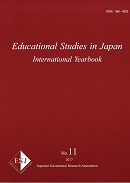Volume 12
Displaying 1-17 of 17 articles from this issue
- |<
- <
- 1
- >
- >|
Editorial
-
2018Volume 12 Pages 1-7
Published: 2018
Released on J-STAGE: October 17, 2018
Download PDF (113K)
Special Issue:Internationalising Japanese Education
-
2018Volume 12 Pages 9-21
Published: 2018
Released on J-STAGE: October 17, 2018
Download PDF (204K) -
2018Volume 12 Pages 23-34
Published: 2018
Released on J-STAGE: October 17, 2018
Download PDF (204K) -
2018Volume 12 Pages 35-48
Published: 2018
Released on J-STAGE: October 17, 2018
Download PDF (205K) -
2018Volume 12 Pages 49-59
Published: 2018
Released on J-STAGE: October 17, 2018
Download PDF (136K) -
2018Volume 12 Pages 61-75
Published: 2018
Released on J-STAGE: October 17, 2018
Download PDF (251K) -
2018Volume 12 Pages 77-90
Published: 2018
Released on J-STAGE: October 17, 2018
Download PDF (301K) -
2018Volume 12 Pages 91-105
Published: 2018
Released on J-STAGE: October 17, 2018
Download PDF (221K) -
2018Volume 12 Pages 107-119
Published: 2018
Released on J-STAGE: October 17, 2018
Download PDF (382K) -
2018Volume 12 Pages 121-133
Published: 2018
Released on J-STAGE: October 17, 2018
Download PDF (453K) -
2018Volume 12 Pages 135-151
Published: 2018
Released on J-STAGE: October 17, 2018
Download PDF (234K)
Review Articles
-
2018Volume 12 Pages 153-155
Published: 2018
Released on J-STAGE: October 17, 2018
Download PDF (86K) -
2018Volume 12 Pages 157-159
Published: 2018
Released on J-STAGE: October 17, 2018
Download PDF (85K) -
2018Volume 12 Pages 161-163
Published: 2018
Released on J-STAGE: October 17, 2018
Download PDF (87K) -
2018Volume 12 Pages 165-167
Published: 2018
Released on J-STAGE: October 17, 2018
Download PDF (88K) -
2018Volume 12 Pages 169-171
Published: 2018
Released on J-STAGE: October 17, 2018
Download PDF (88K) -
Peter Cave, Schooling Selves: Autonomy, Interdependence and Reform in Japanese Junior High Education2018Volume 12 Pages 173-175
Published: 2018
Released on J-STAGE: October 17, 2018
Download PDF (83K)
- |<
- <
- 1
- >
- >|
